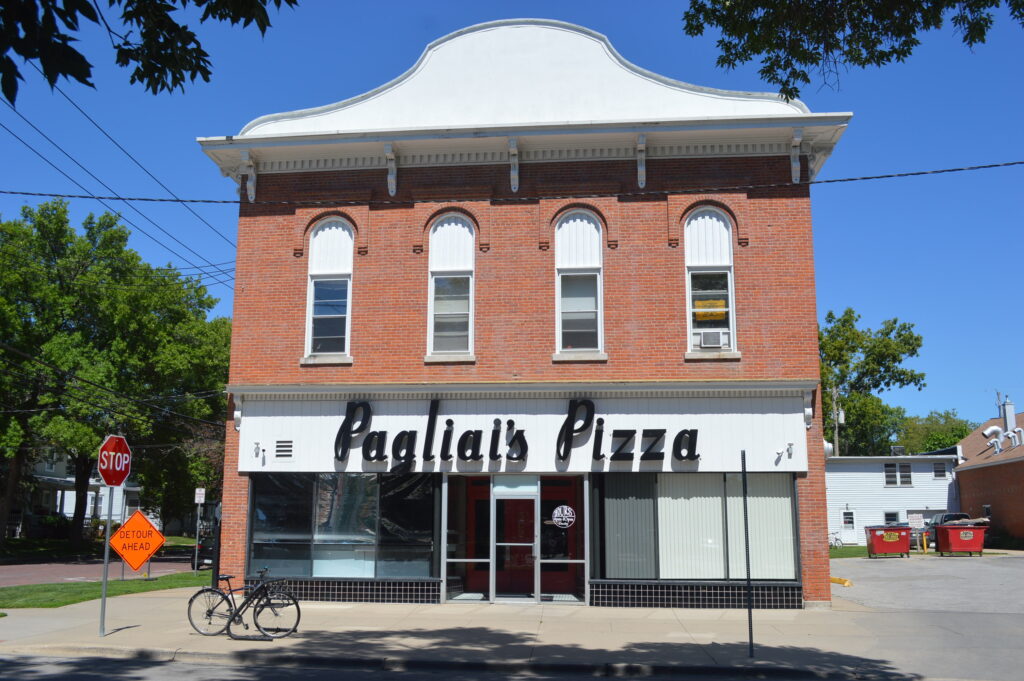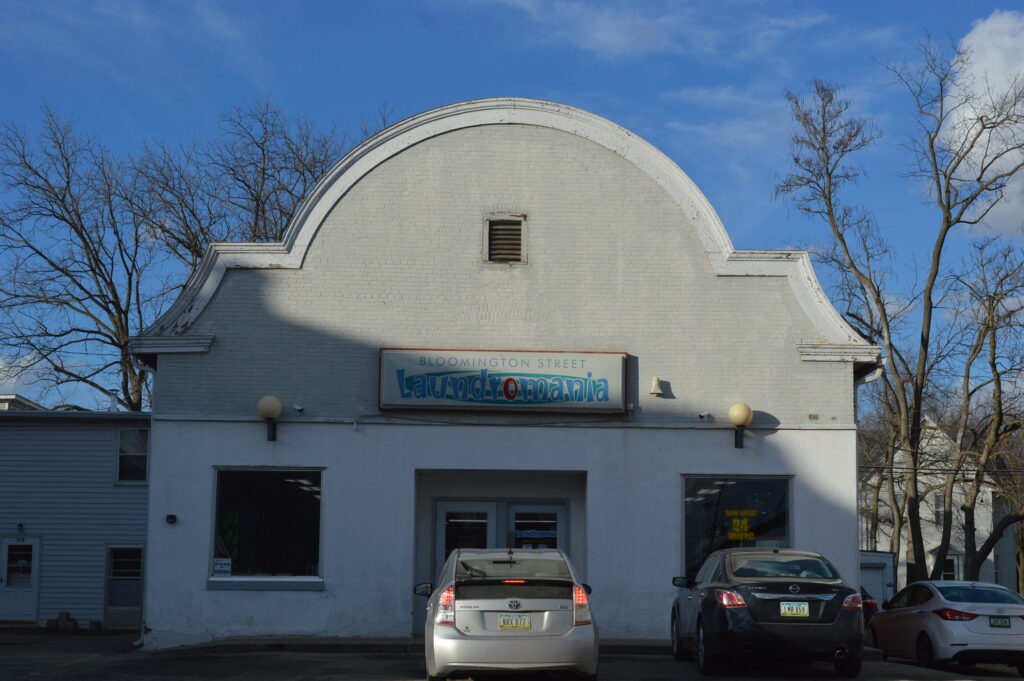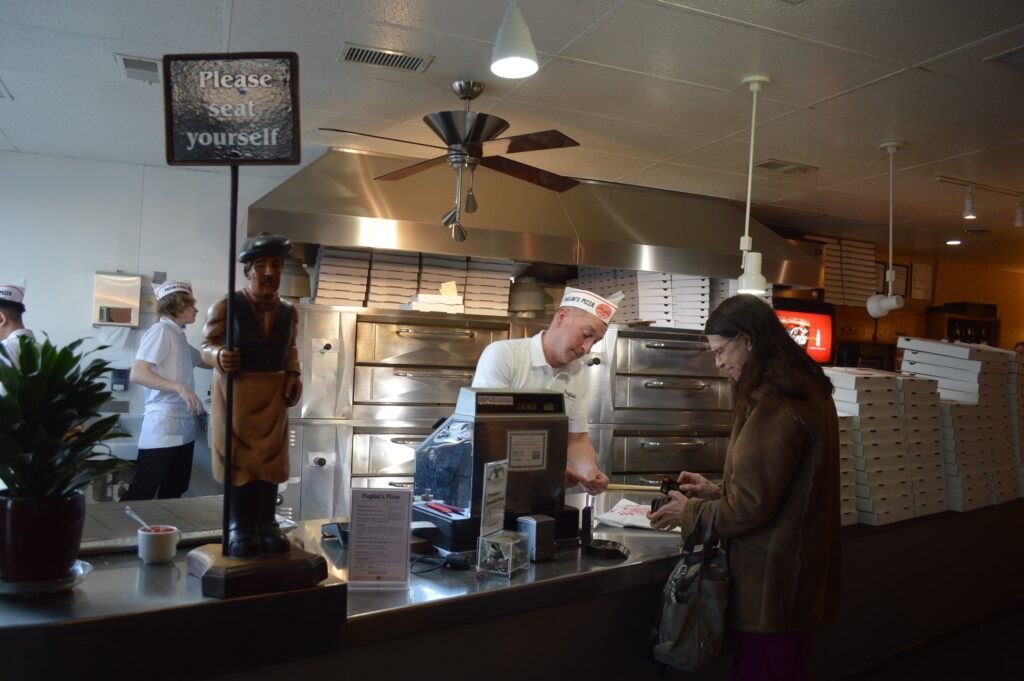
IOWA CITY — After a storm-delayed start and more than 90 minutes of public comment and discussion, the Iowa City Council passed the first of three readings needed to rezone the property where Pagliai’s Pizza is located to become a local historic landmark.
While the April 16 vote was unanimous, both Mayor Bruce Teague and Mayor Pro Tem Mazahir Salih indicated they still have questions about the property, but voted in favor of the motion to allow more time for staff to find answers. Because the owner opposes the historic designation, a super-majority, or six of seven council members, must vote in favor for the measure to pass.
Two more readings are still required.
Related: Iowa City Council to vote on historic landmark status
Located at 302-316 E. Bloomington St., and known formally as the Slezak-Holub-Skarda Building, the site is often referred to as Pagliai’s Pizza, which has leased space on the ground floor of the brick Italianate building since 1969.

Pizzas are prepared inside Pagliai’s Pizza on Feb. 8, 2024, in Iowa City, Iowa. (photo/Cindy Hadish)
Gary Skarda, the fifth-generation owner of the property, which was built between 1875 to 1880, has been opposed to having the buildings locally landmarked, as he hopes to sell it to allow condominiums to be built on the site.
“It’s a joke that the city of Iowa City won’t allow me to do what I want with my property,” Skarda said, adding that it appeared residents are more concerned about the future of Pagliai’s Pizza than the history of the building. “If Pagliai’s wasn’t there, it wouldn’t be a point.”
Supporters of the landmark designation have pointed to the potential loss of a building that is a cultural and historic cornerstone of Iowa City, representing the story of Bohemian immigrants who built it as a fraternal hall for a social center, along with a grocery store, hotel for farmers, saloon and more.
Currently, rent for the 1-bedroom apartments in the building average $800 to $900 per month, lower than the nearly $1,400 monthly average for others in the city, noted council member Andrew Dunn.
While several people spoke on behalf of the Skarda family, others said he is still able to sell the property, whether or not it has a local historic landmark designation, which protects the buildings from future demolition and makes the owner eligible for financial incentives, such as state and federal historic tax credits.
More: 90-year-old Pagliai’s Pizza founder reminisces about restaurant
Eight people spoke in favor of the historic designation during the meeting, and Jordan Sellergren, chairwoman of the Historic Preservation Commission, said the City Council has received more than 100 letters in support of the local landmark.
“The best cities preserve their histories,” Sellergren told the council. “We have very few buildings like this left in our city. Once it’s gone, it’s gone. That’s it.”
Last year, Skarda listed the building for sale for $5 million, including 16 apartments, the portion where Pagliai’s is located and neighboring laundromat, located in a former stable, built for Bohemian immigrant farmers and others traveling to Iowa City in its early days.
Known as Národní Síň, or National Hall, Czech cultural and fraternal organizations, such as ZCBJ, used the upper level for dances and other social gatherings after owner Joseph Slezak constructed the building, which reflected his immigrant roots in Bohemia, later part of the Czech Republic. It was later owned by his son-in-law, Joseph Holub.
Mayor Teague questioned why the laundromat and adjoining former carriage house would be considered historically significant.

The former stable on the property was long ago converted for use as a laundromat. (photo/Cindy Hadish)
“To me, it’s not the totality of all those buildings,” Teague said.
Council member Josh Moe pointed out that an expert had deemed the entire property was actually more historically significant due to those buildings, even though their architecture is more subtle than the building housing Pagliai’s.
“This is rare and only reserved for truly exceptional buildings,” Moe said, citing just 67 local historic landmarks in all of Iowa City.
Mayor Pro Tem Salih asked why the property could not be partitioned, to separate the former stable and carriage house from the building housing Pagliai’s.
“I think we’re asking too much, the whole block,” she said, adding that she voted “yes” to keep the conversation going.
City Attorney Eric Goers said the buildings are all connected and it would be difficult, if not impossible, to divide the property.
Regardless of the outcome, Anthony Fontanini, who owns Pagliai’s Pizza, has said the business has a lease through September 2030, and plans on staying open through that time, if not longer.

Anthony Fontanini, owner of Pagliai’s Pizza, waits on customer Tonja Robins of Iowa City, on Feb. 8, 2024. (photo/Cindy Hadish)
During an afternoon work session, council members met with the city’s Planning & Zoning Commission, which had voted 6-1 in favor of the rezoning after the Historic Preservation Commission unanimously approved the measure earlier this year.
Sellergren said after the meeting that she welcomes the public to stay involved and to thank the City Council for their thoughtful consideration, “but I think a big factor in this decision might rest on what the city can do.”
“How can Iowa City incentivize property owners more (beyond existing state and federal incentives and local historic funds) to opt in to keeping their historic properties standing and in good shape?” she said in an email. “The HPC has proposed some good ideas in the past and this might be a good time for the City to revisit some of those proposals.”
Read more: Council delays vote on Pagliai’s building

[…] More: Iowa City considers historic designation for Pagliai’s Building […]
[…] Read more: City Council gives tepid approval to local landmark designation […]